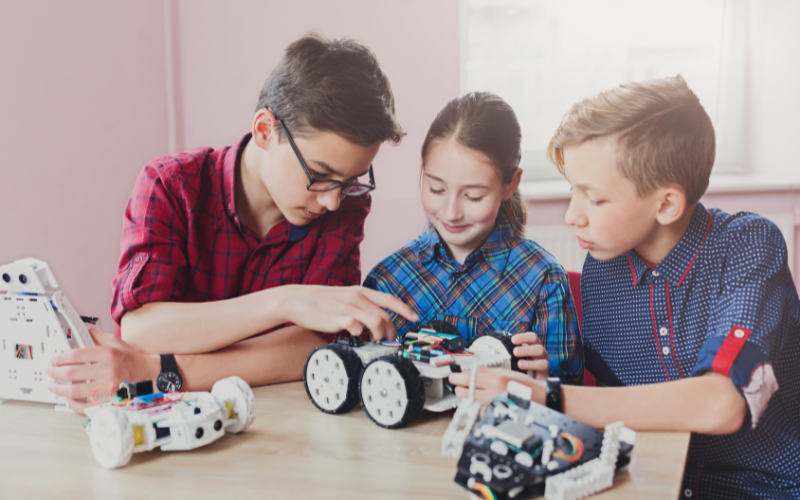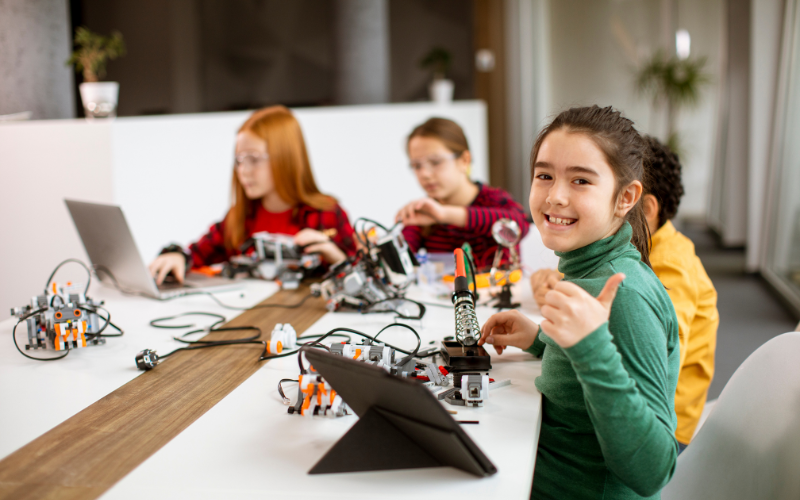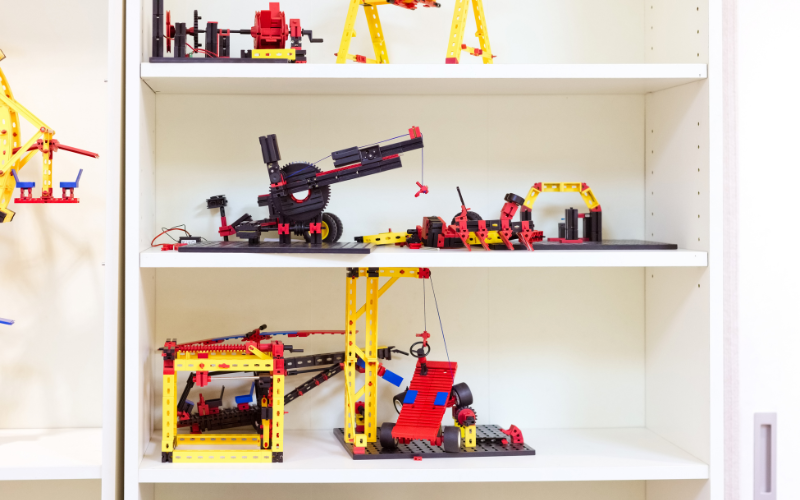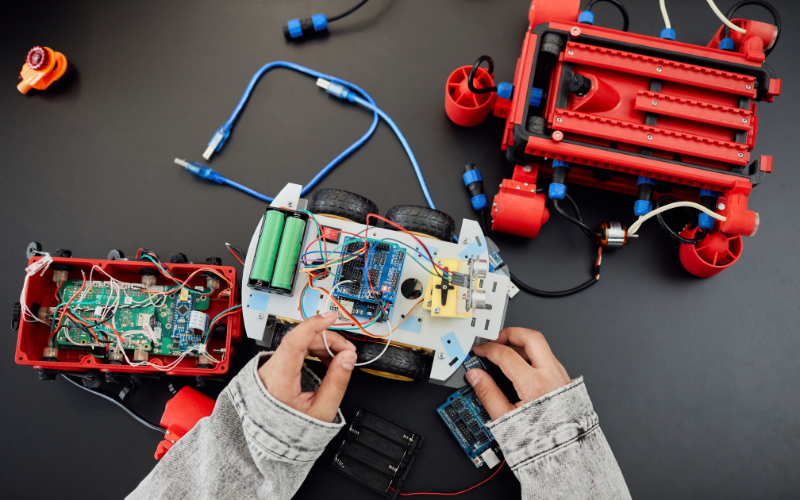Educational Toys for Science – Igniting a Lifelong Passion for STEM
Updated: 23 Feb, 24
11
In today’s rapidly advancing world, a strong foundation in STEM (Science, Technology, Engineering, and Mathematics) education is best for preparing children for future challenges.
Educational toys for science fertilize critical thinking and problem-solving skills and nurture creativity and innovation.
One effective way to foster an early interest in STEM subjects is through educational toys, especially those focused on science.
Let’s explore why these toys are crucial and how they can benefit young learners.
Benefits of Toys for Science Learning
Educational toys tailored for science offer a myriad of advantages for children:

Enhancing Learning Experience
Educational science toys transform abstract concepts into tangible experiences.
By providing hands-on activities and experiments, these toys make learning engaging and memorable.
Children can see, touch, and interact with scientific principles, leading to a deeper understanding of the subject matter.
Fostering Creativity and Innovation
Science toys stimulate creativity and innovation by encouraging children to explore and experiment.
Through open-ended activities, children can unleash their imagination, ask questions, and develop unique solutions to problems.
Whether they are designing a new invention or conducting a scientific investigation, these toys inspire creativity and ingenuity.
Developing Critical Thinking Skills
Many science toys involve problem-solving challenges that require critical thinking skills to solve.
Whether it’s figuring out how to assemble a complex structure or conducting experiments to test hypotheses, children learn to analyze situations, evaluate options, and make informed decisions.
These problem-solving skills are invaluable not only in STEM fields but also in everyday life.
Encouraging Scientific Exploration
Educational science toys spark curiosity and encourage children to explore the world around them.
Children develop a sense of wonder and curiosity about the world by observing natural phenomena, conducting experiments, and asking questions.
This curiosity drives them to seek answers, leading to a lifelong passion for scientific exploration.
Factors to Consider When Choosing Science Toys
When selecting science toys, several factors should be taken into consideration:

Age Appropriateness
Choose toys that are suitable for the child’s age and developmental stage.
Younger children may benefit from simple, hands-on activities, while older children may enjoy more complex experiments and challenges.
Safety Considerations
Prioritize toys that meet safety standards and are free from potential hazards.
Ensure that the toys are made from non-toxic materials and do not have small parts that could pose a choking hazard.
Educational Value
Look for toys that align with educational objectives and offer learning and skill development opportunities.
Consider how the toys can support the child’s learning goals and enhance their understanding of scientific concepts.
Interactivity
Opt for toys that encourage hands-on experimentation and active engagement.
Interactive toys that allow children to manipulate objects, conduct experiments, and make observations foster a deeper understanding of scientific principles.
Top STEM Toys
Let’s explore some of the top educational toys that can ignite a passion for science:

Exploring the Wonders of Chemistry with Science Kits
Science kits offer a comprehensive introduction to the fascinating world of chemistry.
From mixing chemicals to observing reactions, these kits allow children to conduct experiments and explore the properties of matter firsthand.
By engaging in hands-on activities, children learn about chemical reactions, states of matter, and basic chemistry principles in a fun and interactive way.
Building Critical Thinking Skills with Engineering Toys
Engineering toys, such as building blocks and construction sets, allow children to design, build, and test their creations.
These toys encourage children to think critically, solve problems, and use their imagination to create structures and inventions.
Children learn essential engineering concepts such as structural stability, balance, and symmetry by experimenting with different designs and materials.
Unleashing Creativity with Coding and Robotic Toys

Coding and robotics toys introduce children to the fundamentals of programming and robotics in a hands-on and interactive way.
These toys inspire creativity and innovation, from building and coding robots to solving challenges and completing missions.
Children learn about sequencing, algorithms, and problem-solving strategies by programming robots to perform specific tasks.
Enhancing Problem-Solving Abilities with Puzzle and Logic Games
Puzzle and logic games challenge children to think critically, solve problems, and use logic to reach solutions.
From spatial puzzles to logic games, these toys sharpen cognitive skills and promote logical reasoning.
Children develop perseverance, resilience, and a growth mindset by tackling puzzles and overcoming challenges.
Encouraging Scientific Exploration with Microscope and Telescope Sets
Microscopes and telescopes open up new horizons for scientific exploration. Children can observe microscopic organisms, explore celestial bodies, and unlock the mysteries of the universe, all from the comfort of their homes.
By observing the world through a microscope or telescope, children develop a greater appreciation for the beauty and complexity of the natural world.
Conclusion
Educational toys for science are vital in inspiring curiosity, fostering creativity, and developing essential STEM skills in children.
By providing hands-on experiences and engaging activities, these toys ignite a lifelong passion for science and lay the foundation for future success.
Whether children conduct experiments in a chemistry kit, build robots with coding toys, or explore the stars with a telescope, educational science-related toys offer endless learning, discovery, and growth opportunities.
FAQs
Are educational toys for science only suitable for specific age groups?
No, educational toys are available for various age groups, from preschoolers to teenagers, catering to different developmental stages and interests.
Do educational toys for science require adult supervision?
- While some toys may require adult supervision, many are designed to be safe and suitable for independent play. It’s essential to read each toy’s instructions and safety guidelines.
Can educational toys be used in classrooms?
Absolutely! Many teachers incorporate educational toys into their lesson plans to make learning more interactive and hands-on. These toys can enhance classroom activities and reinforce key concepts.
How can parents ensure that educational toys for science are effective?
Parents can ensure the effectiveness of educational toys by choosing toys that align with their child’s interests and learning goals, providing opportunities for open-ended play, and actively engaging with their child during playtime to facilitate learning and exploration.
Please Write Your Comments